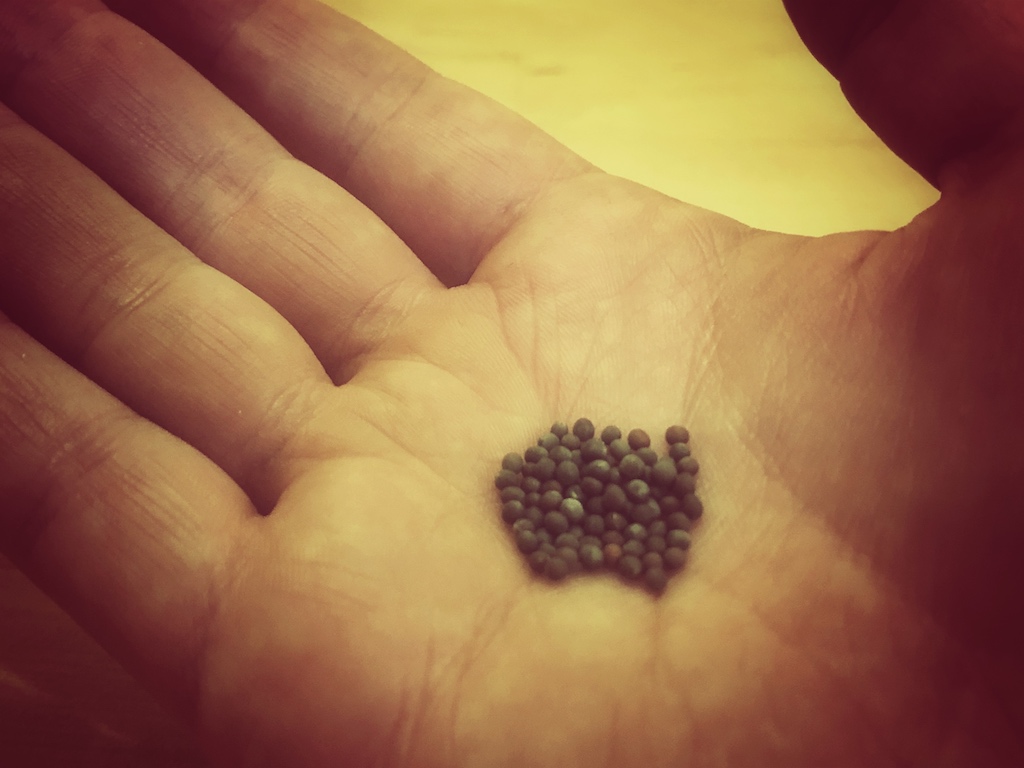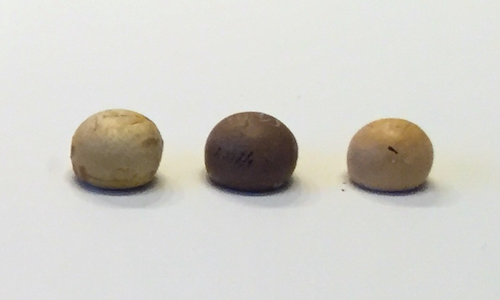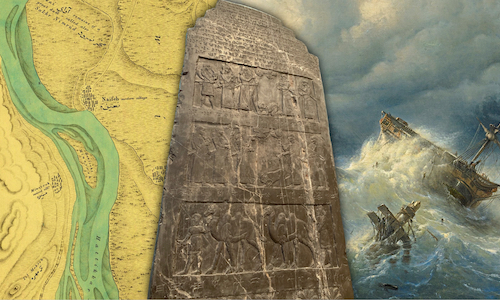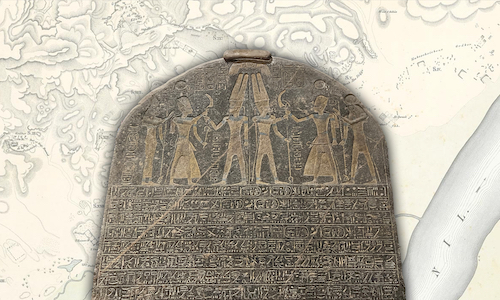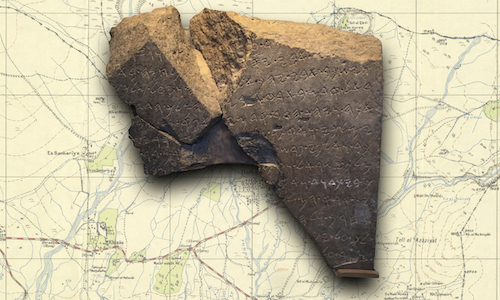The smallest of all the seeds
I recently listened to someone make a defence of a very high view of biblical inspiration. The claim was that every word in the Bible was written down by authors whose involvement in the process was little more than taking dictation from God. If that’s correct, the presenter explained, it would follow that there are no errors of any kind in the Bible.
After making his case the presenter moved on to dealing with “apparent errors” in the bible, starting with its “scientific claims”. Valiant attempts at explaining away biblical cosmology and human anatomy were made before he moved on to one of Jesus’ parables: the parable of the mustard seed. The version recorded in Matthew reads:
Mt 13:31–32 He put before them another parable: “The kingdom of heaven is like a mustard seed that someone took and sowed in his field; it is the smallest of all the seeds, but when it has grown it is the greatest of shrubs and becomes a tree, so that the birds of the air come and make nests in its branches.”1
This parable contains a well known example of a claim that when taken at face value is absolutely false; that of the mustard seed (brassica nigra2) being the smallest seed. Here’s the thing: the mustard seed is not the smallest seed – not by a long shot3. The claim is flat out wrong as there are many seeds which are much smaller. And because it’s Jesus making the claim this example of “scientific inaccuracy” is especially powerful – not only can it be said that “the Bible is wrong”, but Jesus is too.4
What follows is a transcript of what the presenter said. He started off by explaining that “some” believe that,
“Jesus, perhaps because he was constrained by his understanding of the world around him, thought it may be the smallest seed.”
He continued,
“I’d suggest to you that’s almost blasphemous; this is the son of God.”

Sadly, it’s all too common in conservative Christian circles for those who hold strong views on a topic to fling accusations of ‘blasphemy’ or ‘heresy’ in the direction of those who don’t share their views. But, such is life. The presenter continued:
“So how do we understand it? Maybe it was the smallest of the seeds that a sower would have sown. Qualify the word ‘all’ for us. We don’t know; Jesus was there; maybe there was a pile of seeds in front of him and he said “of all these seeds the mustard seed is the smallest one. We don’t know do we. And so I think we need to be careful before we start reading this stuff into the text.”
What a fantastic example of special pleading! Let’s take a look at what the passage actually claims.
The Parable of the Mustard Seed
This teaching of Jesus is found in the synoptic gospels. First, Matthew:
Mt 13:31–32 He put before them another parable: “The kingdom of heaven is like a mustard seed that someone took and sowed in his field; it is the smallest of all the seeds, but when it has grown it is the greatest of shrubs and becomes a tree, so that the birds of the air come and make nests in its branches.”
Next, Mark:
Mk 4:30–32 He also said, “With what can we compare the kingdom of God, or what parable will we use for it? It is like a mustard seed, which, when sown upon the ground, is the smallest of all the seeds on earth; yet when it is sown it grows up and becomes the greatest of all shrubs, and puts forth large branches, so that the birds of the air can make nests in its shade.”
Finally, Luke:
Lk 13:18–19 He said therefore, “What is the kingdom of God like? And to what should I compare it? It is like a mustard seed that someone took and sowed in the garden; it grew and became a tree, and the birds of the air made nests in its branches.”
Only Matthew and Mark mention the seed’s size, describing it as being either the smallest of “all the seeds”, or of “all the seeds on earth”.
Note what the gospels don’t say:
- They don’t say that there were piles of different varieties of seeds in front of Jesus
- In Matthew (13:1) he’s sitting by the sea, an unlikely location for piles of different kinds of seeds to be lying around
- In Mark (4:10) he’s alone with the disciples somewhere; there’s no reason to think that this quiet place alone would have had piles of different types of seed lying around
- In Luke (13:10) he’s in a synagogue on a sabbath day, also an odd place to imagine there’d be piles of different seed varieties lying around
- They don’t say “of all these seeds that are sown on the ground the mustard seed is the smallest one” as the presenter wished it said
- They don’t qualify the word “all”
No further qualification is given – the gospels don’t say that the mustard seed was just a small seed, they don’t say that it was the smallest of the seeds sown in fields, and they don’t say it was the smallest seed known to mankind. They state that the mustard seed was the smallest seed.
The whole point of the parable depends on the mustard seed being thought of as the smallest seed. Jesus was trying to get the message across that the kingdom of God begins as t_he very smallest thing_ and would end up huge, so he chose the mustard seed as his illustration. It was known as the smallest seed, and people knew that it grew into a sizeable plant (I’ve seen them in Israel a couple of meters high at least).
Elsewhere the mustard seed is used in exactly that sense. For example, having failed to cast a demon out of a boy the disciples ask Jesus,
Mt 17:19–20 “Why could we not cast it out?” He said to them, “Because of your little faith. For truly I tell you, if you have faith the size of a mustard seed, you will say to this mountain, ‘Move from here to there,’ and it will move; and nothing will be impossible for you.”
So, to come back to our presenter, when he demands that the word ‘all’ is qualified for him, he’s demanding something of the gospels that they have no interest in doing. The gospels don’t qualify ‘all’. If the presenter wants to add to the text and qualify the unqualified, that’s his own business. It’s not a little ironic that the presenter’s final sentence was,
“I think we need to be careful before we start reading this stuff into the text.”
Well, quite.
The point is that the mustard seed was proverbially small5 – there was no other seed that was smaller. And that’s exactly what we find in Jewish writing.
Mustard seeds in contemporary thought
The view that the mustard seed was the smallest of all the seeds is assumed in Jewish thought from the time of Christ.
The Mishnah’s discussions on the purity and impurity of an amazing range of kitchen utensils makes for pretty dull reading. But, trawl through it for long enough and you’ll find the rules around just how infinitesimally small an amount of “joined up” egg-based dough was required to pollute a kneading-trough standing on an angle6:
…even if [the pieces of dough that made up the egg’s bulk] were small as a mustard seed—it is joined together. (m. Tohar. 8:8)7
There we go. When they wanted to describe the very smallest amount of something, the illustration they used was the mustard seed.
Next up, the Babylonian Talmud. This time we find out just how little menstrual blood the Israelite women considered to be enough to make them ritually unclean:
“Israelite women imposed a strict rule on themselves. If they produce a drop of blood as small as a mustard seed, they refrain from having sexual relations on its account until seven clean days [on which no further blood appeared] have passed.” (b. Ber. 31A)8
Once again the mustard seed is used to illustrate an infinitesimally small amount of something; in this case, blood.
Even in today’s Middle East the idea still lingers – the Theological Dictionary of the New Testament informs us of,
an Arab proverb: “No mustard-seed slips from the hands of the miser.”9
More examples of the mustard seed being used proverbially as the smallest amount of anything could be given but I’ll spare you.
Conclusion
If you subscribe to the idea that every passage in the Bible should be taken literally by default, and you also believe that every claim in the Bible is scientifically accurate, then you’re going to get yourself into trouble.
Though seemingly pious, this literalist approach to biblical interpretation doesn’t make sense on any level. After all, the bible was written by, and to, people who lived thousands of years ago so if it contained modern science it wouldn’t have made any sense to those it was addressed to in the first instance.
So, coming back to that presentation defending a “high” view of inspiration… It turns out that because of the presenter’s presuppositions of inerrancy and scientific accuracy of scripture he felt the need to explain away what appeared to him to be a scientifically inaccurate claim in the text. Instead, he should have recognised that he was dealing with a colloquialism; a figure of speech. Had he done so he wouldn’t have completely missed the point of what Jesus was teaching. What he should have recognised is the passage’s proverbial use of the mustard seed’s small size, not a scientific claim about their comparative size.
The mustard seed being the smallest seed is not a question of science, it’s a question of culture.
So, if you’re reading something that looks like a scientific claim, first make sure that you’ve taken the cultural context into account before declaring the passage’s apparent scientific claim a hill to die on.
Footnotes
-
Unless otherwise noted all scripture quotations from The Holy Bible: New Revised Standard Version (Nashville: Thomas Nelson Publishers, 1989) ↩
-
R. T. France, The Gospel of Matthew (The New International Commentary on the New Testament; Grand Rapids, MI: Wm. B. Eerdmans Publication Co., 2007), 527. ↩
-
See Moles, Angela T., David D. Ackerly, Campbell O. Webb, John C. Tweddle, John B. Dickie, and Mark Westoby. “A Brief History of Seed Size.” Science 307, no. 5709 (January 28, 2005): 576-580. ↩
-
Let’s be clear – the issue here isn’t lazy atheist arguments against the Bible, but fundamentalist Christians who burden the Bible with claims it doesn’t make for itself. ↩
-
Ulrich Luz, Matthew: A Commentary (ed. Helmut Koester; Hermeneia—a Critical and Historical Commentary on the Bible; Minneapolis, MN: Augsburg, 2001), 261. ↩
-
Zzzzzzzz……. ↩
-
Jacob Neusner, The Mishnah : A New Translation (New Haven, CT: Yale University Press, 1988), 1054. ↩
-
Jacob Neusner, The Babylonian Talmud: A Translation and Commentary (vol. 1; Peabody, MA: Hendrickson Publishers, 2011), 205. See also b. Meg. 4:4, I.7.L. ↩
-
Claus-Hunno Hunzinger, “Σίναπι,” ed. Gerhard Kittel, Geoffrey W. Bromiley, and Gerhard Friedrich, Theological Dictionary of the New Testament (Grand Rapids, MI: Eerdmans, 1964–), 288. ↩
